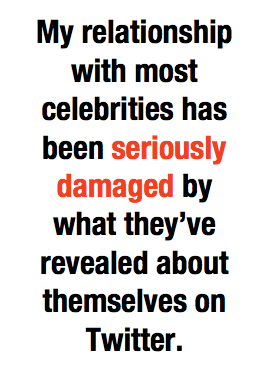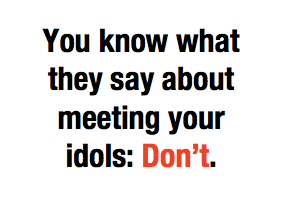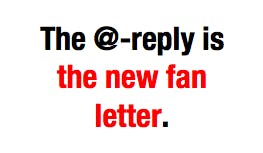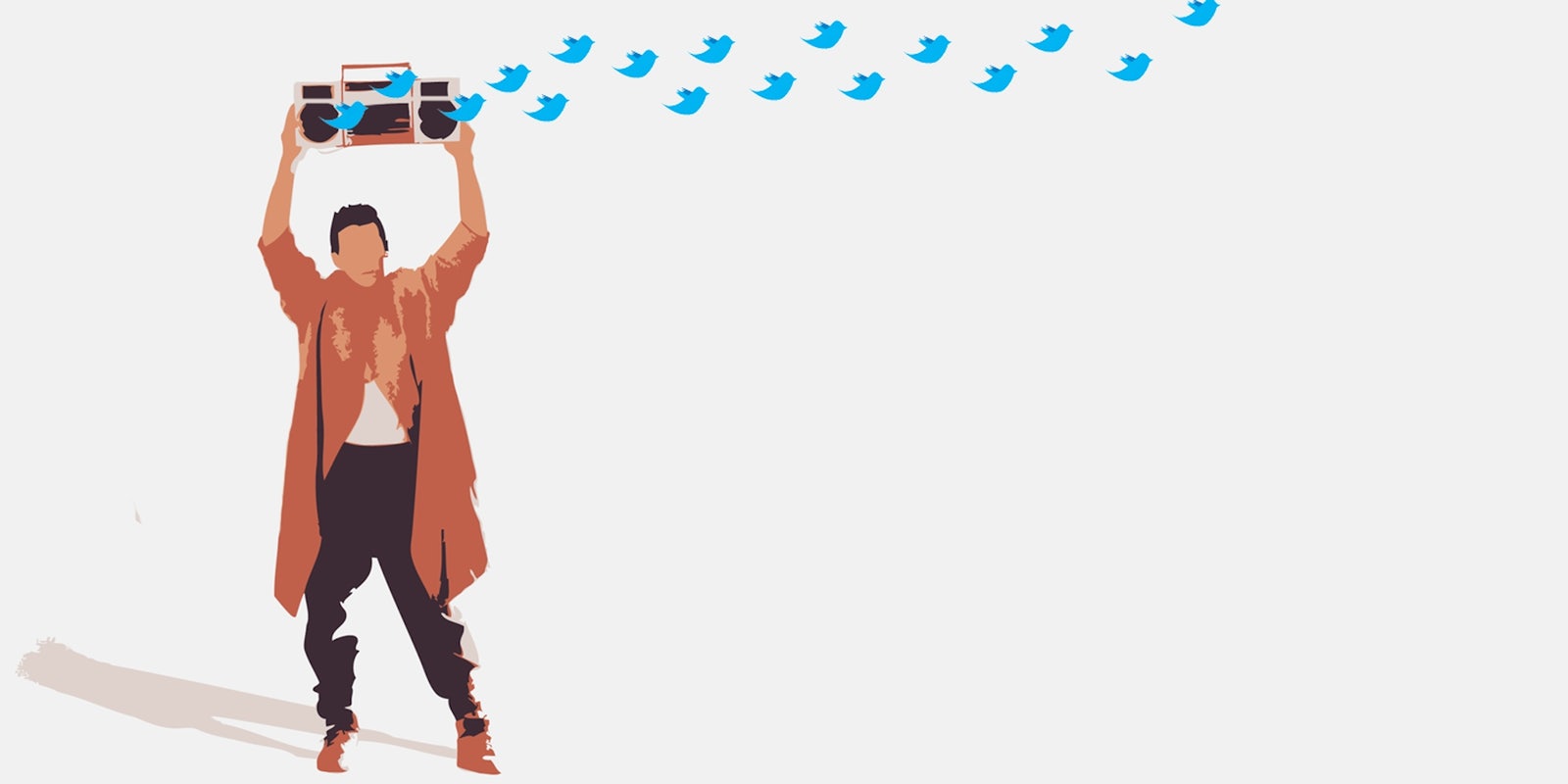I have a friend who contends that the only celebrity worth following on Twitter is Michael Caine. She could very well be right. This is for the simple fact that Michael Caine on Twitter—imitated by many, replicated by none—is nothing but Michael Caine on Twitter. Michael would never do a hashtag meme. He would never drop gratuitous mentions of hanging out with Lindsay Lohan at Chateau Marmont or tweet incessantly about his movie being released on Netflix. Instead, Michael Caine on Twitter is wishing people the very best for the New Year and expressing joy at reaching 80. You can even hear his one-in-a-million voice as he tweets: “Thank You for your kind Birthday messages. Will blow the candles off.”
Michael Caine, bless his heart, is a shining example for them all.
My relationship with most celebrities has been seriously damaged by what they’ve revealed about themselves on Twitter, and I’m willing to bet I’m not alone in that. John Cusack—the love of my life when I was a freshman in high school, the embodiment of everything I ever wanted in a boyfriend, the pinnacle of teenaged angst—is, I discovered to deep dismay, a terrible speller. Johnny Bench overuses exclamation marks. Bret Easton Ellis is simply terrifying.

You know what they say about meeting your idols: don’t. I’ve been let down by so many tweeting celebrities that I have mostly stopped following them at all. They were too real, too human—and not in a fun “They’re just like us!” kind of way. They misspell. They over-punctuate. They complain. They tweet too much. And most of all, they’re boring. They are human beings who have to make dinner and wash their faces and sit in traffic. And then, of course, tweet about it. Just like the rest of us.
But wait, you other dedicated lovers of John Cusack cry out! Isn’t this precisely the reason we follow them in the first place? When Beyoncé entered the Tumblr fray with a photograph of her feet, the masses squealed in delight. Us Weekly had never thought to publish a picture of Beyoncé’s feet. The novelty of it all, the intimacy: her feet! And even if they had, it wouldn’t have been sanctioned by Mrs. Carter herself. The authorized feet. And that’s the whole point. Here was a moment in Beyoncé’s life that she wanted to share. Perhaps she really loved that shade of sea foam green, and like any girl, wanted to show it off to all of her friends.
You guys, we’re Beyoncé’s friends.
So who cares what that glittery beacon is actually saying, in the end? That’s the gist of it: The masses of people following a celebrity on social media are in on a conversation with the object of their adulation. They can even tell that celebrity exactly how they feel with a simple little piece of punctuation: @.
The at-reply is the new fan letter. If you were at all like me when you were younger, you, too, wrote pages of looping teenaged script to your favorite celebrities, legs tucked up underneath you as you sat under your poster of Robert Smith, composing a seven-page account of what Keanu Reeves’ acting meant to you, constructing a piece of highlighter art to be tucked into an envelope bound for Michael Stipe. They never wrote back; the most you ever hoped to receive would be a machine autographed band photo from the management. The one time I did receive a letter from a celebrity was when I was 16 and had met the lead singer of the Gin Blossoms after one of their shows, and he promised me he’d write if I wrote to him via their fan club. I did, and he did. A single page on a spiral memo pad in which he recommended that I read Jim Carroll’s The Basketball Diaries. Probably no more than 140 characters.
Gone is the looping teenaged script, replaced by a little looping @ through which we can express our cares and concerns for these celebrities, where we can make desperate requests for RTs and birthday wishes and follows. If he retweets me, he sees me. If she follows me, I matter.
Acknowledge me. Tell me you see me.

And the most tantalizing part? It actually happens.
I have to admit that even I have fallen victim to this gooey feeling of visibility. Blur’s Alex James once at-replied me a cheese recommendation. John Cusack dropped my handle while responding to someone else—the lowest form of acknowledgement, but nonetheless an incredible thrill. I ran around the office giddily telling everyone I met that Lloyd Dobler mentioned me in a tweet. I have virtually high-fived a friend for being retweeted by Martha Plimpton, and when my favorite relief pitcher sent me a note on my birthday (after I at-replied him that it was my birthday, of course), I told my poor husband that it was the best present I’d ever received.
And yet what is the investment taken in these tiny interactions? In 1993, the lead singer of the Gin Blossoms had to put pen to paper, buy a stamp, find a mailbox. In 2013, he would just have to move his thumbs. What is the real message, other than I’m participating in social media and expressing general politeness by replying to a fan?
As a whole, what are they really telling us about themselves anyway, in 140 characters? What are they truly saying, with pictures of their feet?

I followed Paul Rudd‘s Instagram account for a few weeks, captivated mostly by the devoted and mildly disturbing comments from fans that followed every intimate (or so I thought) moment he posted from his daily life. The fans wanted him to know that they were happy for him, happy to see him so happy. They shared their feelings with him in comment form, they reveled in every sweet moment he posted with his wife, laughed with him as he goofed around with celebrity friends Will Arnett and Jason Bateman for the camera.

As it turns out, the account was fake, just as made up as a movie script, a figment of an overactive and mildly disturbing imagination, visual and interactive fanfiction.
If it had been Paul Rudd, would those pictures have told us any more than the pictures or words we post tell you anything about our lives? It told us more about his fans than it did about him. A real account, however, is also ultimately just for the fans. You see the moments that are carefully chosen, if not staged, then consciously selected from the multitude of photographs we take daily on our phones. Our self-selection is just like theirs: We choose to show the world the best version of ourselves, or the version we wish to project in the moment, carefully considered and choreographed, edited down to perfection.
(Except for maybe John Cusack’s.)
The moment we hit follow, we hope to know what celebrities are really like behind the makeup and the stage lights and the producers. But we’re all human, all of us still in the midst of composing ourselves. Even when we know, we don’t really know.
Maybe the thrill of the reply is enough.
Zan McQuade is a writer, editor, photographer, translator, and baseball enthusiast living in Cincinnati, Ohio. Her words and images can be found at www.thatcupoftea.com.


